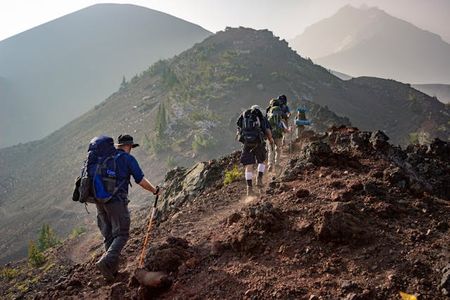Useful Skills for Outdoor Adventurists
 Super Cool
15 Mar, 2025
8 mins read
74
Super Cool
15 Mar, 2025
8 mins read
74

Outdoor experiences offer an incredible chance to get away from the daily grind, re-establish a connection with the natural world, and push yourself in novel and thrilling ways. Having the correct tools and abilities can make any adventure—whether it's camping under the stars, scaling tall peaks, or exploring dense forests—an experience that will never be forgotten. But the wild is erratic, and without proper planning, even the most beautiful terrain can become dangerous. Being able to adjust to your environment is essential for everything from traversing new paths to dealing with emergencies. This essay examines the fundamental abilities that all outdoor enthusiasts should possess to ensure their safety as well as their capacity to approach nature with interest and confidence.
Getting Around
Even experienced travelers can become lost in the outdoors more easily than they may realize. For this reason, one of the most important abilities for outdoor adventurers is navigation. Not only should a map and compass be essential pieces of equipment, but you should also be proficient in their use. While a compass aids in self-orientation and helps you keep on course, topographical maps offer comprehensive information on topography, elevation, and water sources. Smartphone apps and GPS devices can be very useful, but they are not infallible. You may become stranded due to malfunctioning software, dead batteries, or a lack of signal. Learn natural navigation methods for extra protection, such as determining the cardinal directions by looking at the sun's position, the North Star, or even the patterns of moss growth. You can get the confidence you need to rely on these abilities in high-stakes or remote situations by practicing them in a controlled setting.
Building a Shelter: Remaining Secure and Cozy
Even the best-laid plans can be derailed by unforeseen delays or abrupt weather changes since nature can be unpredictable. In these situations, being able to build a shelter is essential to being dry, warm, and safe. A well-constructed shelter retains body heat, which is essential for avoiding hypothermia while protecting from wind, rain, and extremely high or low temperatures. It's worthwhile to learn how to construct a lean-to using organic materials like branches, leaves, and bark, particularly in situations where it might not be practical to carry a tent. Practice swiftly and safely erecting your tent, even in inclement weather like heavy rain or strong winds, if you have one. A campground should always be on level, dry ground, away from potential dangers such as exposed ridges, flash flood zones, and falling branches. Building a shelter is a means to guarantee that you may rest and recuperate, enabling you to fully enjoy your excursion. It's not merely a survival skill.
Equipment & Tools
Every outdoor enthusiast understands the importance of having the appropriate equipment on hand, and a practical folding knife is among the most useful and essential of these. Cutting rope, cooking, slicing wood for kindling, and making emergency tools are just a few of the many uses for these folding knives. Because of its small size, it can be carried easily without adding extra weight to your equipment. However, a folding knife is only the first step. Fire starters, such as magnesium rods or waterproof matches, are essential for cooking, remaining warm, and calling for assistance. Trekking poles help lessen the physical strain on your body on lengthy hikes or rough terrain, while multi-tools such as screwdrivers, scissors, and pliers offer further versatility. Having each tool is vital, but so is knowing how to utilize it successfully and efficiently. To make sure you're ready for whatever obstacles the wilderness may present, practice these techniques before you go.
Emergency Preparedness and First Aid
No explorer should undervalue the importance of being able to handle medical problems in the wilderness. Professional assistance may be hours or even days away in distant locations, therefore your preparedness and understanding are essential. You can learn how to treat common injuries like burns, sprains, wounds, and bug bites by taking a basic first aid course. In addition to being aware of the fundamentals, it's critical to have a complete first aid kit that is customized for your particular journey and has supplies like bandages, antiseptic wipes, and pain or allergy drugs. Being prepared for emergencies extends beyond first aid. It's equally crucial to know how to signal for assistance. Learn how to make signal fires or spell out SOS using natural materials, and carry a whistle, mirror, or brightly colored clothing to draw attention. These abilities can mean the difference between being saved and being left stranded in emergencies. Mental preparedness is another aspect of emergency preparedness; maintaining composure and concentration can significantly improve your capacity to manage challenging circumstances.
Preparation is just as important to outdoor adventure as exploration. Gaining proficiency in navigation, shelter construction, first aid, and tool use enables you to confidently and enthusiastically face the unpredictable nature of the wild. These skills allow you to completely enjoy the peace and beauty of nature in addition to keeping you safe. Practice and constant learning are essential because there's always something fresh to learn or a talent to hone. Therefore, keep in mind that preparedness is your best friend while you pack your belongings and make plans for your upcoming journey. The wild is waiting for you, ready to test and motivate you in equal measure. If you put in the effort to improve your abilities, you'll discover that every trip turns into a celebration of your resourcefulness and fortitude as well as an adventure.
Written By:
Super Cool



Hotels at your convenience
Now choose your stay according to your preference. From finding a place for your dream destination or a mere weekend getaway to business accommodations or brief stay, we have got you covered. Explore hotels as per your mood.


